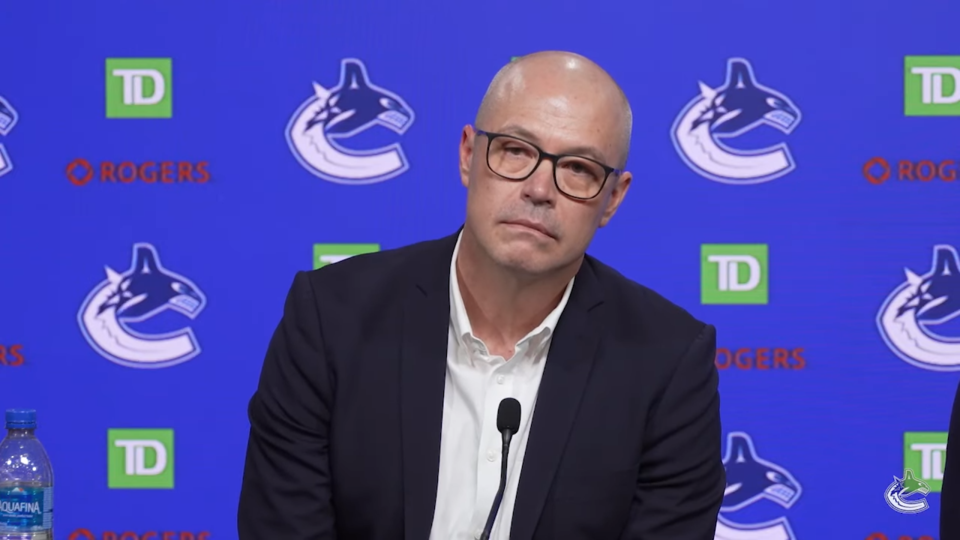The Vancouver Canucks have a tricky offseason ahead of themselves. Based on the contracts already on their books, the Canucks are over the salary cap for next season and still have restricted free agents to sign, including the “emerging” Ethan Bear.
The biggest issue is not whether the Canucks will be cap compliant — of course, they will — but whether the team will be able to make significant improvements when they’re already so tight to the cap.
"I don't want to use buyouts if we don't have to."
Clearing cap space, then, is a priority for general manager Patrik Allvin. During Monday’s season-end media availability, however, he made it clear that one method of clearing cap space is off the table.
“My intention is not to use buyouts,” said Allvin. “I've got the support from Jim [Rutherford] and the ownership to put a competitive team in place here but my vision too is if you do buyouts now that might affect you down the road.”
The Canucks are well aware of how buyouts can have a long-term impact. The Canucks still had $2.4 million in dead money on the books this past season from the Braden Holtby and Jake Virtanen buyouts.
“I just think that this group is touching the surface of becoming a good team,” continued Allvin. “So, I don't want to use buyouts if we don't have to. I don't want to use buyouts that are going to affect us in a couple of years when this group is actually, hopefully taking off.”
While the Canucks have made some moves that suggest a short-term focus, it’s gratifying to see Allvin take a longer view when it comes to buyouts. There’s a tacit admission here that the Canucks have a long road ahead of them in order to become a true contender — it would be shortsighted to use a buyout this offseason just to get back to the playoffs for one season.
Instead, Allvin and his management team will need to figure out a way to clear cap space through other means.
"My job is to improve my team here and part of it is to be creative and find [cap] flexibility," said Allvin. "We acknowledge we weren't good enough, so there's going to be some changes."
"I think that Oliver has the potential to still be a good NHL player."
The question of buyouts is particularly pertinent when it comes to one player: Oliver Ekman-Larsson.
Some Canucks fans have assumed that Ekman-Larsson, who has a $7.26 million cap hit through 2027, will be bought out this summer. The trouble is that a buyout causes long-term pain for short-term gain. An Ekman-Larsson buyout would leave dead money on the Canucks’ salary cap through 2031.
Allvin acknowledged that Ekman-Larsson struggled this season but believes the veteran defenceman still has a role to play on the Canucks.
“I thought he was very inconsistent,” said Allvin. “I do believe that Oliver — with the right mindset and the conversations we had here over the last couple of months — that he's willing to sacrifice to get his game back. I think that Oliver has the potential to still be a good NHL player.”
Allvin also suggested that the addition of Adam Foote and Sergei Gonchar to the coaching staff will help Ekman-Larsson, as will the changes to the team’s defensive structure, which he only got to partially experience before suffering a season-ending injury. Allvin believes that Ekman-Larsson can still play in the Canucks’ top four on defence.
In other words, not only will Ekman-Larsson not be bought out but he’s also expected to still play a significant role on the Canucks’ blue line.
There are reasons to believe that Ekman-Larsson might be able to bounce back. Last offseason, he suffered a setback when he broke his foot at the World Championships, hindering his training. Both Ekman-Larsson and Allvin pointed to that as a major reason for his struggles this season. It’s possible that he will perform better with a full offseason to train.
On the other hand, Ekman-Larsson will be turning 32 and was on the decline for years before coming to Vancouver. It is more likely that Ekman-Larsson continues that decline than that he experiences a renaissance.




